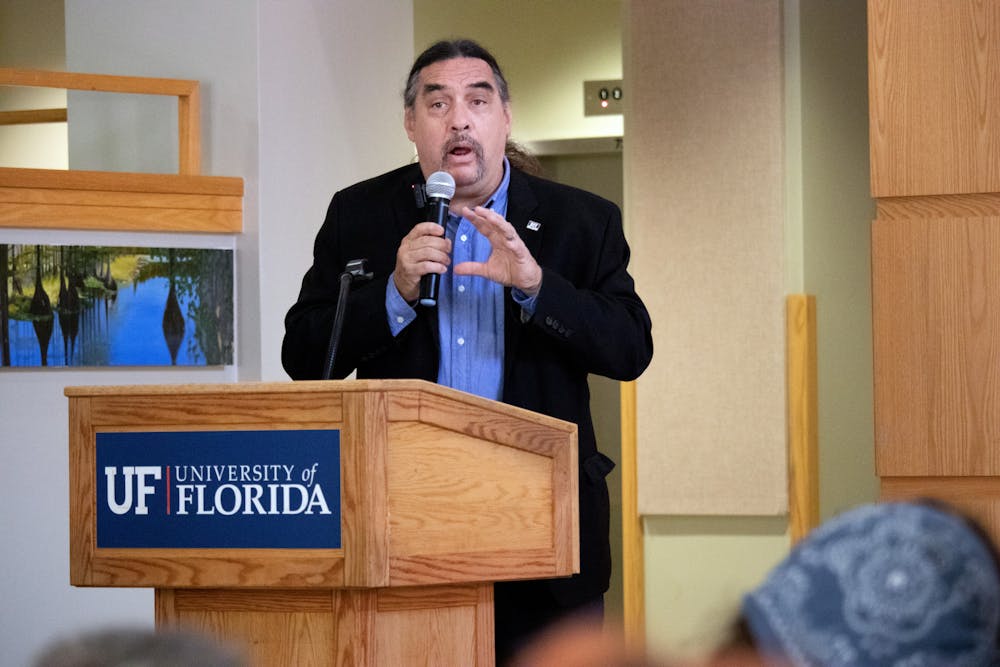Despite being surrounded by water on three sides and receiving on average 53 inches of rainfall a year, Florida’s most fragile resource is water.
At the Future of Florida Springs symposium held at Pugh Hall, activists, authors and assorted experts came together to weigh in on the current state of Florida’s over 1,000 freshwater springs. The conclusion? They are in grave danger.
Vasilios Kosmakos, a recent UF graduate and the event’s coordinator, made a concerted effort to make sure the message was at the forefront of the discussion April 1. Kosmakos’ care for Florida's waterways has been lifelong, he said.
“I grew up on the beach in Treasure Island, Florida,” he said. “My grandparents are fishermen from Greece. Water is life.”
Kosmakos has done extensive research on Florida’s waterways. Through the Florida Naturalist Oral History Project, he’s conducted 60 in-depth interviews with everyone from fishermen to policymakers to illustrate the springs’ worsening conditions. Several of his subjects were invited to speak April 1.
The presentations centered around the history, overall health and restoration efforts of the springs. Leading environmental figures such as Robert Knight, executive director of the Florida Springs Institute, and Gregory Owen, senior planner of the Alachua County Environmental Protection Department, posited their theories on the current delicate state of the springs — and later disagreed on who should bear that responsibility.
Panelists presented their worries about the overpumping of Florida’s springs, along with fears of misappropriated funds for restoration.
Knight, who has conducted lifelong research on wetland restoration, cited agriculture as a large factor in the depletion of Florida springs.
“About 90% of the problem is with about 30,000 corporations and people,” he said. “If you turn off the water when you're brushing your teeth it's … not going to solve the problems.”
Conversely, Owen felt the responsibility of protecting Florida’s water is also that of the individual.
“We all need to think about this together,” Owen said. “Maybe turning your water off while you brush your teeth isn't really impactful, but as we approach this collaboratively, that’s how we’re going to have this restoration.”
This call for collaboration was echoed by panelist Matt Cohen, scientist and professor. Personal consumption matters, he said.
“If every resident of Gainesville eliminated meat one day a week,” Cohen said, “we would save, collectively … a water footprint equivalent to the flow of the Ichetucknee River.”
Workshops followed the Q&A session with guests having the opportunity to cycle through the rooms of Pugh to learn more about conservation photography from Linda Wilinski, stakeholder communication from Sadie Hundemer or scientific writing from Sandra Poucher.
This quiet period in the Pugh Hall Ocora gave Kosmakos a moment to reflect on the success of the event, which was the culmination of research started in August 2021.
Kosmakos anticipates guests will take the lessons they learned past the lecture hall and far beyond UF’s campus, he said.
“I hope they come [back] with a more nuanced perspective of these issues,” he said. “Just because something is complicated doesn't mean we can't figure things out.”
Most importantly, Kosmakos said, he hopes the symposium would serve as a reminder that the ability to have a productive discussion, regardless of belief, is what propels us forward.
“This world is so divided,” he said, “Have conversations. Be intellectually honest … Have conversations because humanity is at its best when we come together and we discuss ideas.”
Contact Sydney at sjohnson@alligator.org. Follow her on Twitter at @sydajohnson15.

Sydney Johnson is the Fall 2025 multimedia editor. This is her second semester in the role. She previously served as the assistant multimedia editor and a general assignment reporter for the university desk. When she is not at the Alligator, she is capturing North Central Florida for WUFT News. In her free time, she can be found sewing, hiking or logging movies on Letterboxd.






